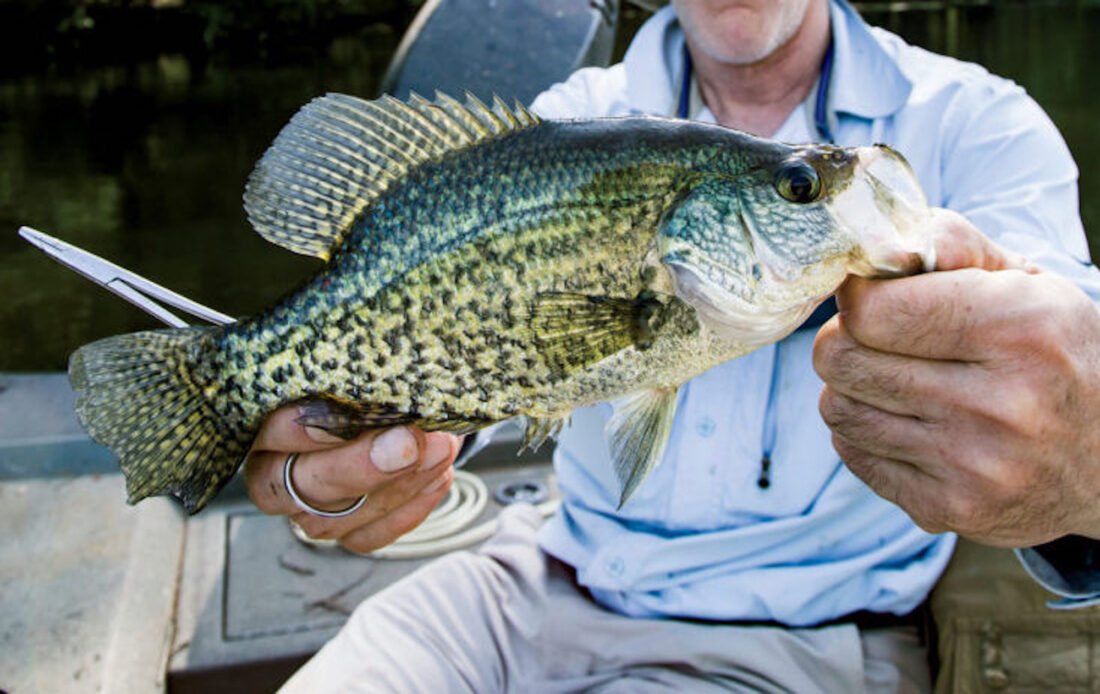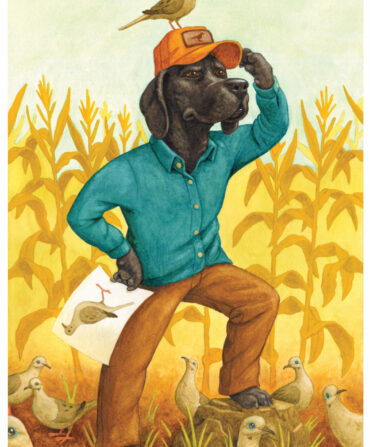About this time of year, as soon as the weather warms up enough to tease the first jonquils out of the dirt, crappie move from deeper water in ponds, lakes, and sloughs toward more shallow waters for spawning. These feisty—and very tasty—freshwater panfish aren’t hard to catch. Schools of them stack up around treetops that have fallen into the water or around any kind of bushy structure. Some folks sink old Christmas trees within casting distance of a pond bank to lock in an easy-to-access hotspot. Others anchor boats over good cover and practically seine the water with cane poles. Truth be told, a minnow on a hook, a small flashy spinner, half a six-pack of beer, and an afternoon playing hooky from work is all it takes to catch enough crappie to keep you busy cleaning fish until you beg for some relief.

What’s really confounding isn’t how to catch the fish, but something more primary: how to pronounce their dang name. Here, things get dicey.
There are at least two accepted pronunciations of the word. Some say “crappie” so it rhymes with “happy.” Others pronounce it so it rhymes with “poppy.” Down he-yah in the Southern climes, most folks go with the former despite its potty-mouth connotations. But in more Western and Northern states, and along the fringes of the South, “crop-pee” rules the day. Even the lexicographers can’t agree. Rhymes with “happy,” decrees the Merriam-Webster Dictionary. Not so fast, saith the Oxford English Dictionary. Rhyming with “poppy” is A-OK, too. So how are we common perch-jerkers supposed to come to a consensus?
To sort things out required a deep dive into etymology, and for that I needed to ring in with Dr. Julie Palmer, a historical linguist and the nation’s leading scholar on the various pronunciations of “crappie.” Okay, her actual gig is Associate Professor of Modern Languages at Hampden-Sydney College, in a particularly crappie-rich region of south-central Virginia.
According to Palmer, the original name of this bespeckled problem-causer is the French crapet, meaning “rock bass,” and that term likely would have spawned the French Canadian crappé. So far, so sensical. The fish was originally found in more Northern regions and was then transplanted widely across the country.
Then things get sticky. As Palmer explains it, word pronunciations often depend on whether the word was first seen written, or first heard. Palmer says that English speakers in Northern regions of the United States first pronounced the word as they would have likely heard it: “crop-ay,” which morphed at some point into today’s variant, pronounced “crop-ee.”
But Southerners might have picked up the word from written sources. According to the OED, the first known instance of the word in printed form was in the 1861 issue of a magazine called Sportsman W. Prairies, and it came out “crappé.” Then, Palmer figures, speakers shortened the “a” before the double consonant to rhyme with “happy.” The same rule applies to “apple.” Which, to my mind, is an all-American fruit and a pretty solid blow supporting my rhymes-with-happy position.
Linguistic history aside, I’m still going to hew to rhymes-with-happy because that’s what Mr. Bobo called them, and Mr. Bobo was the old man who introduced me to fishing half a century ago in North Carolina. But I’m giving a gold star to the Cajuns of Louisiana, who sidestep all this consternation by calling the fish sac-a-lait. That means “sack of milk,” a possible reference to the sweet, mild taste of a crappie fillet pulled smoking hot from a deep fryer.
And honestly, doesn’t that sound like a delicacy that should rhyme with happy? I think I’ve made my case.
It’s important to understand, Palmer notes, that it’s natural for there to be variations of pronunciations. But it’s also important to understand, she says, that “Southerners aren’t going to let this go easily, I can tell you that.”
Now, for dessert, who would like a piece of PEE-can pie? Call it anything else around my house, and you’ll go hungry.
Follow T. Edward Nickens on Instagram @enickens.








